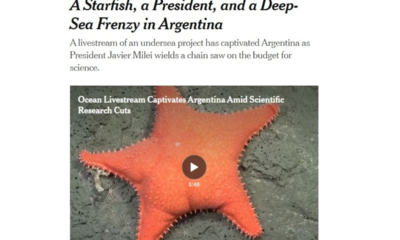INTERNACIONAL
India’s Modi gives army freedom to act as tensions rise with Pakistan after deadly terror attack
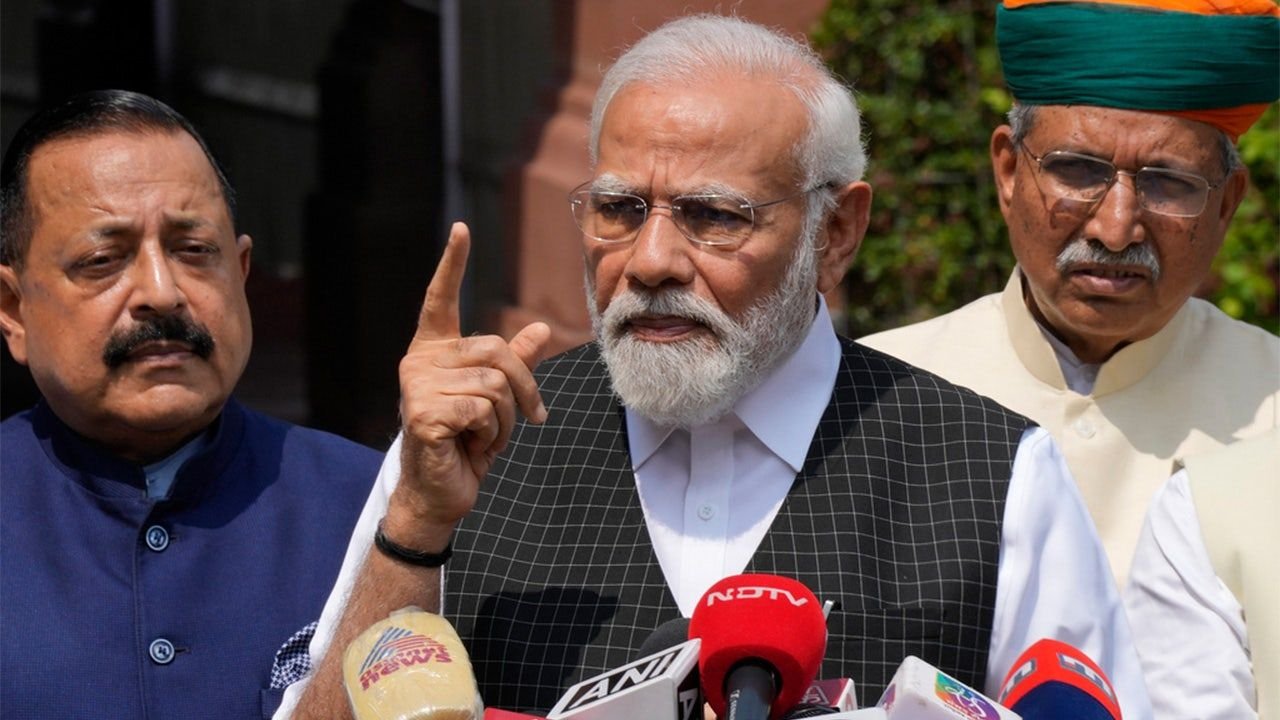
India’s Prime Minister, Narendra Modi, is giving the armed forces near complete freedom of action to respond following a deadly attack on tourists in the disputed Jammu and Kashmir region on April 22 that saw 26 people killed by terrorists. India and Pakistan have exchanged fire every day since the attack along the Line of Control that separates the Indian and Pakistani areas of Kashmir.
The Times of India reported on Tuesday that Modi has given the military the operational freedom to decide on the mode, targets, and timing of the response to the attack in Kashmir.
PAKISTAN FEARS INDIA INCURSION ‘IMMINENT’ AMID HEIGHTENED TENSIONS FOLLOWING TERROR ATTACK
Kashmiri villager women walk past the blown-up family home of Asif Shiekh, a militant who officials all is involved in the deadly attack on tourists in Pahalgam, at Monghama village in Tral, south of Srinagar, Indian controlled Kashmir, Friday, April 25, 2025. (AP Photo/Dar Yasin)
Modi is set to convene another meeting of the Cabinet Committee on Security (CCS) on Wednesday to coordinate India’s next moves.
Modi recently said India will «identify, track and punish every terrorist, their handlers and their backers,» in a post on X. «We will pursue them to the ends of the earth,» Modi added.
India’s Defense Minister Khawaja Muhammad Asif told Reuters that the country has mobilized its forces because retaliation is «something which is imminent now.»
The Resistance Front (TRF), an extremist group linked to the Lashkar-e-Taiba terrorist organization based in Pakistan, claimed responsibility for the attack in Pahalgam. Lashkar-e-Taiba was responsible for the 2008 Mumbai attacks and is known to have links with the Pakistani military and a partnership with Pakistan’s Directorate for Inter-Services Intelligence (ISI).
Pakistan has denied any involvement in the attack.
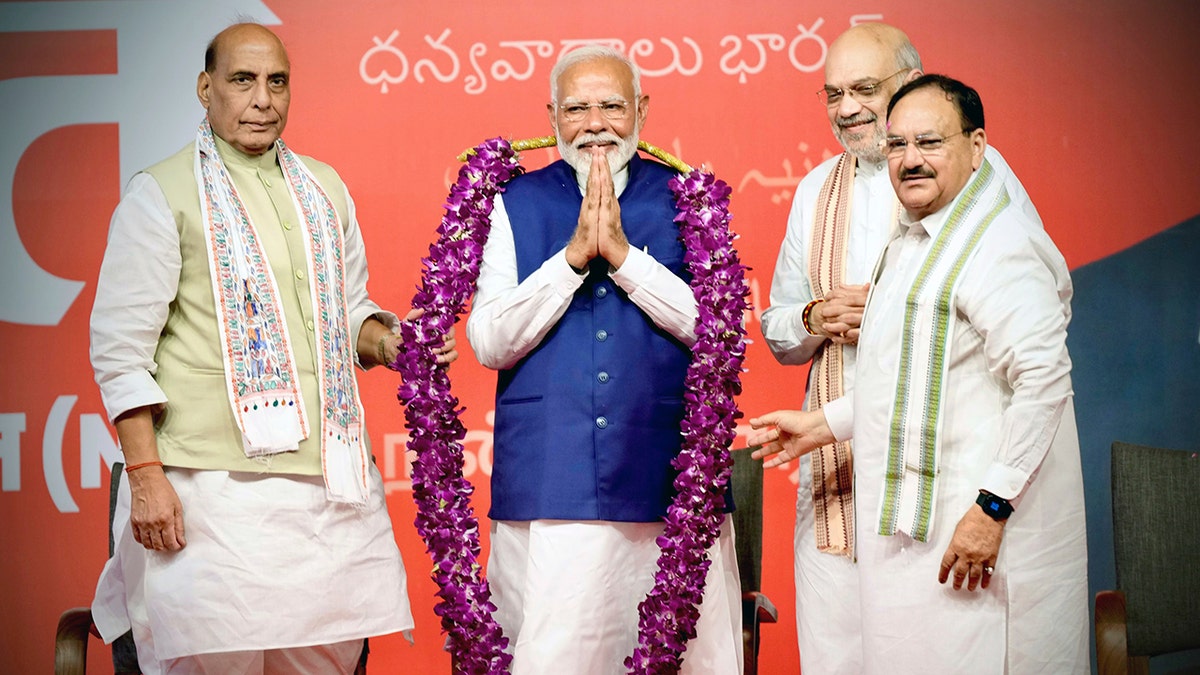
Prime Minister Narendra Modi is garlanded by senior Bharatiya Janata Party (BJP) leaders Rajnath Singh, left, party President JP Nadda, right, and Amit Shah, at the party headquarters in New Delhi, India, Tuesday, June 4, 2024. (AP Photo/Manish Swarup)
The attack, which killed 26 people and was the worst terrorist attack on India since the 2008 Mumbai attacks, has increased tensions on the Indian subcontinent between two nuclear-armed powers.
«An Indian military response is likely reflecting the more muscular foreign policy of the Modi government as noted by its actions following previous terrorist attacks,» Chietigj Bajpaee, senior research fellow for South Asia at Chatham House, told Fox News Digital.
HERE’S WHY A FLARE-UP BETWEEN INDIA AND PAKISTAN OVER KASHMIR MATTERS
Bajpaee noted that a surgical strike or airstrike is the most likely form of retaliation, and the response will likely take a calibrated approach to limit collateral damage and civilian casualties and to control the escalation ladder in order to keep the conflict below the nuclear threshold.
«However, this is easier said than done given the possibility of accidental escalation» and a «broader tit-for-tat military escalation cannot be ruled out,» he warned.
Although there was limited outreach from Modi in the past, two rounds of escalation in 2016 and 2019 have soured relations.
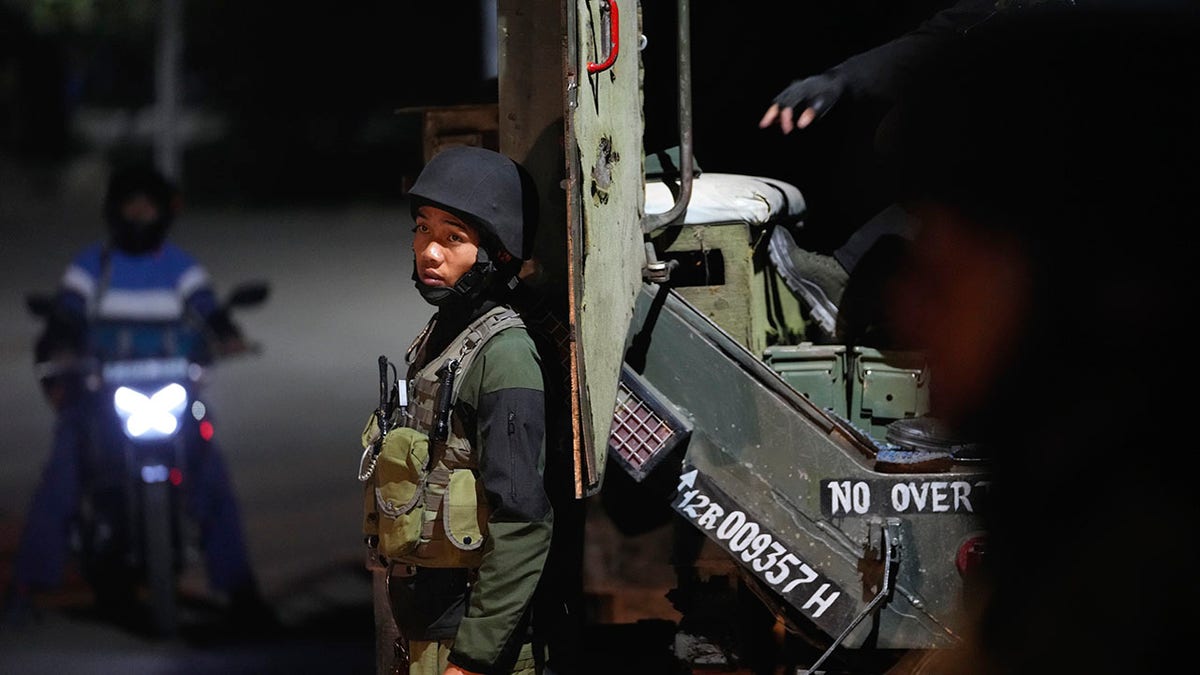
Indian army officers stands guard near Pahalgam in south Kashmir after assailants indiscriminately opened fired at tourists visiting Pahalgam, Indian controlled Kashmir, Tuesday, April 22, 2025. (AP Photo/Dar Yasin)
Sadanand Dhume, senior fellow at the American Enterprise Institute, told Fox News Digital that Modi is facing pressure to mount a tough response.
«The Indian public is outraged by last week’s terrorist attack in Kashmir, and Prime Minister Narendra Modi is under immense pressure to respond to the atrocity by striking Pakistan, which has long sponsored attacks on India,» Dhume said.
INDIA VOWS TO HUNT TERRORISTS ‘TO THE ENDS OF THE EARTH’ AS TENSIONS WITH PAKISTAN RISE AFTER KASHMIR ATTACK
Already India has suspended the landmark 1960 Indus Water Treaty, a key water-sharing agreement covering rivers that overlap both countries. Pakistan’s Minister of State for Law and Justice told Reuters that Islamabad plans on challenging India’s suspension of the treaty and is raising the issue with the World Bank.
Pakistan said the impediment to the free flow of water would constitute an act of war.
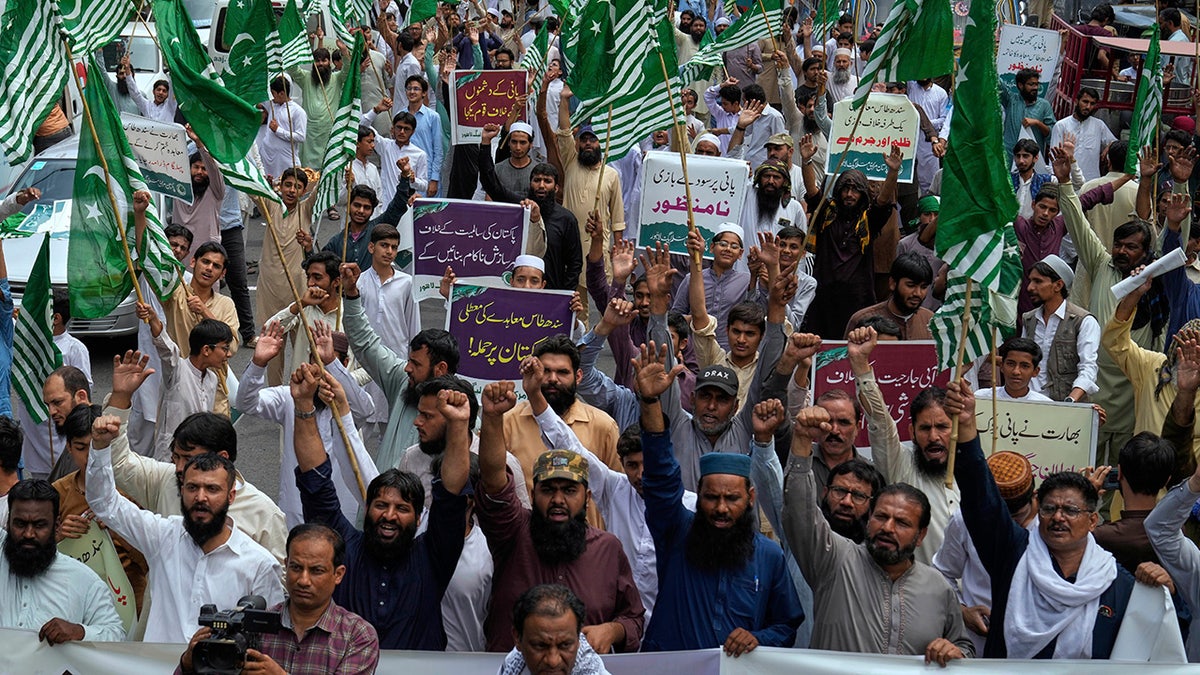
Supporters of the Pakistan Murkazi Muslim League party protest against the suspension of water-sharing treaty by India with Pakistan, in Lahore, Pakistan on Thursday, April 24. (AP/K.M. Chaudary)
The rivalry between India and Pakistan dates back to the partition of the former British colony of India in 1947, with the establishment of Muslim-majority Pakistan and Hindu-majority India. The partition plan also provided the contested regions of Jammu and Kashmir with the opportunity to choose if they wanted to join either newly established nation. Kashmir ultimately decided to join India in exchange for help against invading Pakistani militias, with India and Pakistan fighting three wars over the territory since 1947.
CLICK HERE TO GET THE FOX NEWS APP
India and Pakistan have an estimated combined 342 nuclear warheads, according to the Arms Control Association.
INTERNACIONAL
Alemania suspendió las exportaciones militares a Israel: Netanyahu criticó la medida de Merz

Alemania anunció este viernes la suspensión “hasta nuevo aviso” de las exportaciones de material militar que podría ser utilizado por Israel en operaciones en la Franja de Gaza, según declaraciones del canciller Friedrich Merz. La decisión se produce después de que el gabinete de seguridad israelí aprobara en la madrugada un plan militar destinado a ocupar la Ciudad de Gaza, en el marco de un conflicto armado que se acerca a dos años y ha suscitado una creciente presión internacional.
El primer ministro israelí, Benjamin Netanyahu, trasladó personalmente su “decepción” a Merz tras comunicarse telefónicamente, de acuerdo con la oficina de Netanyahu. El mandatario expresó en un comunicado que, “en lugar de apoyar la guerra justa de Israel contra Hamas, que llevó a cabo el ataque más horrendo contra el pueblo judío desde el Holocausto, Alemania premia el terrorismo de Hamas con su embargo de armas a Israel”. Netanyahu subrayó que el objetivo de su gobierno “no es tomar Gaza, sino liberar Gaza de Hamas y permitir que se establezca un gobierno pacífico” en el enclave.
En respuesta, Merz afirmó que Israel “tiene derecho a defenderse del terrorismo de Hamas” y reiteró que la liberación de los rehenes israelíes y las negociaciones para un alto el fuego son “la máxima prioridad” para su gobierno. El canciller argumentó que la reciente ofensiva israelí “dificulta cada vez más” la posibilidad de lograr estos objetivos, y explicó que, en consecuencia, el Gobierno Federal no aprobará exportaciones de armamento hacia Israel que puedan ser utilizadas en Gaza mientras continúe la actual situación militar.
La medida marca un cambio notable en la política exterior de Alemania, que, junto con Estados Unidos e Italia, figura entre los principales proveedores de equipos militares del ejército israelí. El Instituto Internacional de Investigación para la Paz de Estocolmo (SIPRI) reportó que Alemania suministró el 30% de las importaciones de defensa de Israel el año pasado, incluidas corbetas Sa’ar y motores para tanques Merkava y transportes Namer que operan activamente en el terreno gazatí. El Ministerio de Economía alemán cifró en 485 millones de euros (alrededor de 565 millones de dólares) el valor de aprobaciones de exportaciones de defensa a Israel entre octubre de 2023 y mayo de 2025.
El canciller Merz insistió en que “Hamas no debe tener ningún papel en el futuro de Gaza”, pero enfatizó que una acción militar más severa “obliga a Israel a asumir una responsabilidad aún mayor hacia la población palestina”. Solicitó explícitamente el acceso sin restricciones de ayuda humanitaria, incluso para organizaciones de la ONU y otras ONG, ante una situación humanitaria calificada como crítica por Naciones Unidas y diversos organismos internacionales de derechos humanos.

La posición alemana cobra especial relevancia debido a la histórica política proisraelí de Berlín en el contexto europeo, forjada en gran parte por la memoria del Holocausto. Alemania se había resistido en los debates de la Unión Europea a endurecer colectivamente la postura frente a Tel Aviv, o secundar anuncios como los de Francia y Reino Unido en torno al reconocimiento de un Estado palestino o la imposición de sanciones a colonos israelíes.
Diversos gobiernos europeos, entre ellos Países Bajos, Dinamarca y Eslovenia, aumentaron recientemente la presión diplomática y militar sobre Israel. Eslovenia prohibió ya las exportaciones e importaciones de armas con destino al país a raíz de las operaciones israelíes en Gaza. La presidenta de la Comisión Europea, Ursula von der Leyen, manifestó en la red X que la ampliación de la ofensiva israelí “debe reconsiderarse” y pidió aumentar la entrada de ayuda. Funcionarios de República Checa y Países Bajos también advirtieron sobre los riesgos de escalar la operación militar.
Desde el inicio de la guerra, desencadenada por el asalto de Hamas el 7 de octubre de 2023 que dejó 1.200 muertos y 251 secuestrados en Israel, la ofensiva aérea y terrestre israelí ha provocado decenas de miles de muertes en Gaza, vastos desplazamientos y extensos daños a infraestructuras, acercando al enclave a una situación de hambruna.
La medida anunciada por Berlín sigue sin detallar qué sistemas concretos quedan afectados, y el gabinete de Merz evitó especificar los equipos incluidos. Analistas internacionales estiman que el freno será temporal y especializado en componentes susceptibles de uso directo en Gaza. El gobierno alemán también instó a Israel a “no dar más pasos hacia la anexión de Cisjordania” y advirtió que su responsabilidad humanitaria “aumenta” bajo la nueva ofensiva, mientras decenas de miles de civiles palestinos se preparan para nuevos desplazamientos y se mantiene la incertidumbre sobre la suerte de los rehenes israelíes todavía cautivos en el enclave.
(Con información de Europa Press y AP)
conflict,government aid,human rights,politics,unrest, conflicts and war,war
INTERNACIONAL
Georgia attorney general sues GOP opponent in governor’s race over campaign financing

NEWYou can now listen to Fox News articles!
Georgia Attorney General Chris Carr, one of the leading Republican contenders for governor, has filed a lawsuit against Lt. Gov. Burt Jones, challenging the legality of his GOP rival’s campaign funding.
Carr asked a federal judge to permanently block Jones’ ability to spend money from his leadership committee, a fundraising tool that allows the state’s governor, lieutenant governor and legislative leaders to raise unlimited funds.
Both men are leading Republican candidates to succeed term-limited GOP Gov. Brian Kemp after next year’s election.
Carr argues that Jones’ leadership committee violates the attorney general’s First Amendment right to free speech and his 14th Amendment right to equal protection by setting up a campaign finance structure that boosts Jones and limits how much Carr can spend on his campaign. A 2021 state law that created leadership committees does not allow Carr or other declared candidates to have access to the fundraising vehicle.
Carr’s regular campaign committee is limited to raising $8,400 from each donor for his primary campaign and $4,200 for a potential primary runoff.
FORMER GEORGIA LT. GOV. GEOFF DUNCAN ABANDONS GOP TO JOIN DEMOCRATIC PARTY
Georgia Attorney General Chris Carr, pictured here, sued Lt. Gov. Burt Jones over the legality of the lieutenant governor’s campaign funding. (Megan Varner/Getty Images)
Carr campaign spokeswoman Julia Mazzone said in a statement that Jones «is using his position to sidestep contribution limits, raise six-figure checks during legislative sessions and funnel unlimited money into a competitive primary through a structure only he can access.»
«Republicans cannot ignore the cloud of unethical, illegal and corrupt behavior that surrounds Burt Jones,» Mazzone said.
«Leadership committees were never intended to be unregulated campaign machines,» the statement added. «The court has ruled on this before, and the Constitution prohibits exactly what’s happening here. We’re taking action to uphold transparency and accountability standards.»
A Jones campaign spokesperson, meanwhile, has accused Carr of being hypocritical since his office previously defended the same law that he is now challenging in court. Carr has argued that the attorney general must defend challenged laws even if he personally disagrees with them.
«Georgia’s lackluster Attorney General defended this law two years ago,» Kendyl Parker, Jones’ spokeswoman said. «Now, he’s running for governor and wants to challenge the same law he once defended. If hypocrisy were an Olympic sport, he’d take gold.»
Carr launched his gubernatorial bid last year, saying he needed more time to raise money because he is not personally wealthy. His campaign has expressed concerns for months that Jones will use his leadership committee and family wealth to support his primary campaign.
REPUBLICAN DOOLEY JUMPS INTO GEORGIA’S SENATE RACE WHILE TOUTING SUPPORT FOR TRUMP AND TAKING AIM AT OSSOFF
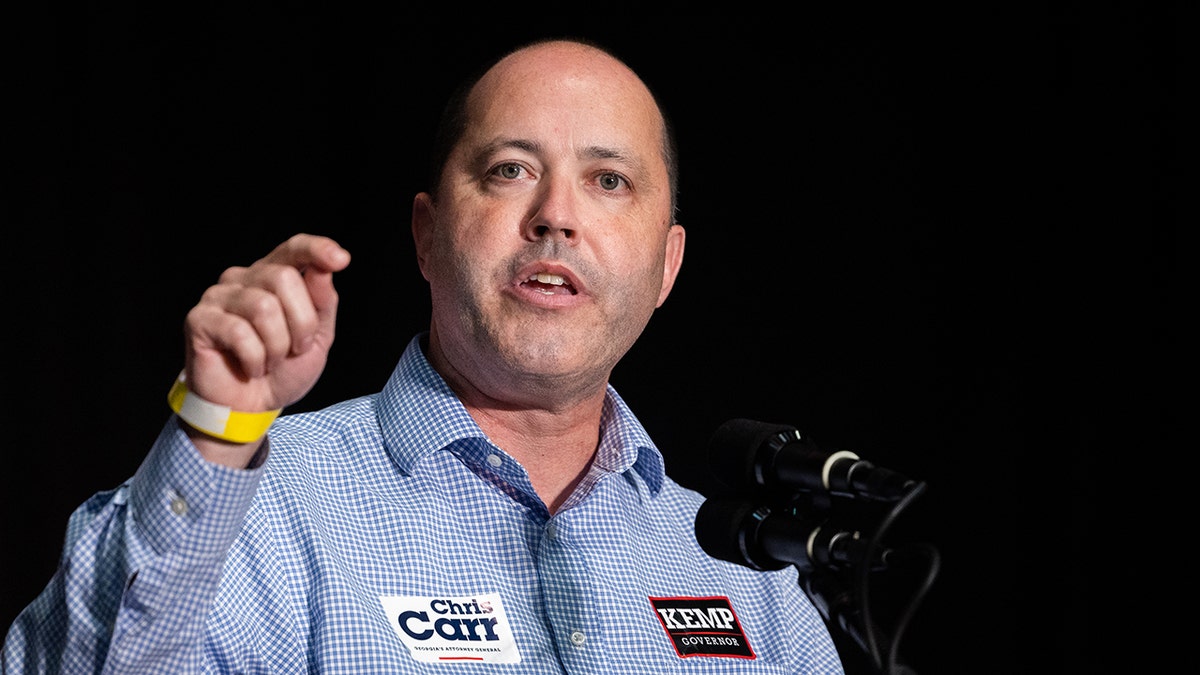
Georgia AG Chris Carr asked a federal judge to permanently block Lt. Gov. Burt Jones’ ability to spend money from the lieutenant governor’s leadership committee. (Nathan Posner/Anadolu Agency via Getty Images)
The Carr campaign has sought to have the state Ethics Commission probe the source of a $10 million loan Jones made to his leadership committee, although the commission declined to launch an investigation, noting that Carr failed to allege a legal violation.
The attorney general’s campaign pointed to U.S. District Judge Mark Cohen’s 2022 ruling that a leadership committee for Kemp could not use money for Kemp’s re-election campaign during that year’s Republican primary. Cohen found that the «unequal campaign finance scheme» violated GOP primary challenger and former U.S. Sen. David Perdue’s First Amendment right to free speech.
Cohen ruled that Kemp could continue raising money for the leadership committee but said the governor could not spend it against Perdue in the primary.
«Despite full knowledge of this history, Mr. Jones and his leadership committee, WBJ Leadership Committee, Inc., are ignoring this Court’s prior rulings and using a leadership committee—that has no contribution or coordinated spending limits—in a primary election against a candidate without one,» Carr’s lawsuit reads.
Carr is seeking additional restrictions on Jones’ leadership committee than in Cohen’s ruling. The attorney general is asking a judge to cut off both fundraising and spending from the lieutenant governor’s leadership committee until the primary race is over.
He is also requesting that a federal magistrate judge be appointed to oversee all spending by the leadership committee and that Jones’ regular campaign committee repay any money already spent by the leadership committee to support Jones’ gubernatorial run.
«The loan and its amount are significant because Mr. Jones is also able to raise unlimited funds into the leadership committee, then repay the loan from funds raised that then can be applied directly to his campaign account, effectively removing the contribution limits from those dollars,» the lawsuit says.
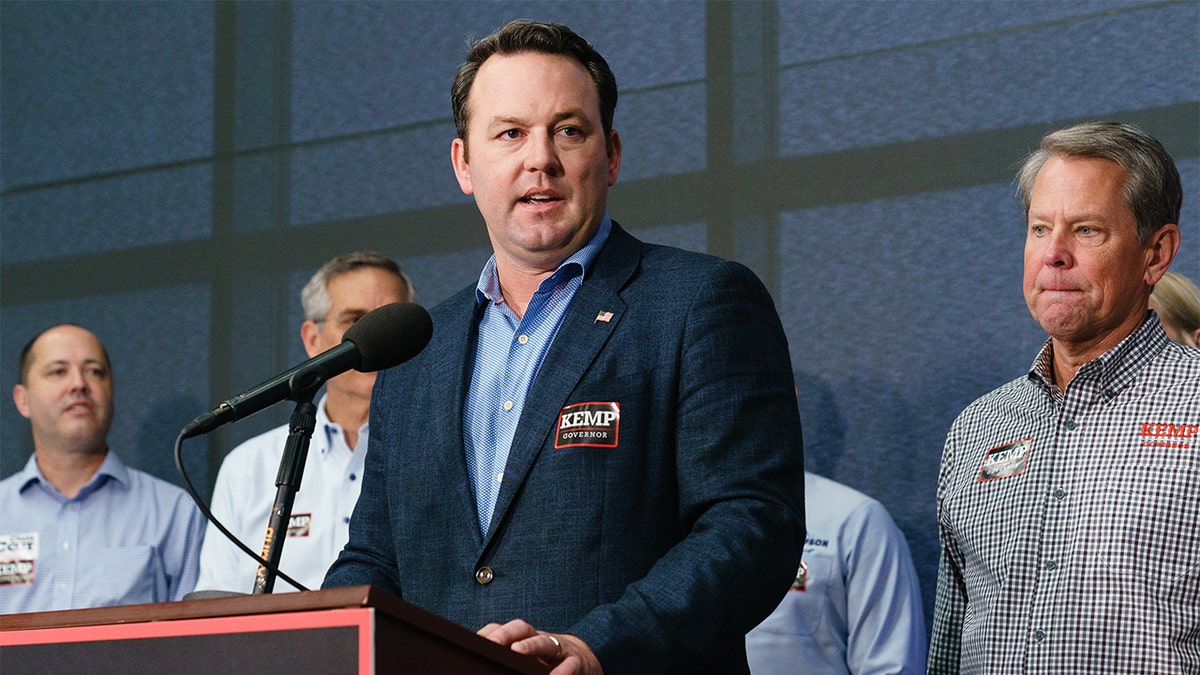
Lt. Gov. Burt Jones’ campaign criticized Georgia AG Chris Carr as a hypocrite since his office defended the same law in 2022 that he is now challenging in court. (Elijah Nouvelage/Getty Images)
Carr asks that the court block Jones from giving any cash to dark money groups or making any loans to his regular campaign committee during the primary. He also wants the magistrate judge to probe where Jones’ $10 million loan came from, citing a 2022 financial disclosure showing that Jones did not have enough liquid assets for a loan of that quantity.
The attorney general’s campaign continues to express concern that Jones could raise unlimited money to repay his loan and then give the repaid money to his candidate committee for the primary, arguing that this would wreck campaign contribution restrictions.
«Mr. Jones is raising and spending unlimited amounts of money in the primary—and Mr. Carr is limited in what he can raise by Georgia’s existing campaign contribution limits,» the lawsuit reads. «This Court should level this uneven playing field by preventing Mr. Jones from using his leadership committee during the primary election.»
CLICK HERE TO GET THE FOX NEWS APP
Carr’s campaign has also called on the Ethics Commission for an advisory legal opinion on whether Jones’ fundraising activity is legal.
The Republican primary will be held in May, and the general election next year in the purple state is expected to be one of the most expensive governor’s races in the country.
The Associated Press contributed to this report.
georgia,us,politics,republicans elections,elections,elections state and local
INTERNACIONAL
Trump-Putin summit could happen as soon as next week

NEWYou can now listen to Fox News articles!
A summit between Russian President Vladimir Putin and U.S. President Trump could be happening as soon as next week.
Fox News can report that officials are tentatively planning for a Trump-Putin summit at the end of next week, according to a source familiar with the planning. The location is still up in the air but Hungary, Switzerland, Rome and the United Arab Emirates are in the mix, Fox News is told.
ZELENSKYY TELLS PUTIN TO ‘BE BRAVE’ AND FINALLY AGREE TO TRILATERAL MEETING WITH TRUMP
President Donald Trump is expected to meet in person with Russia’s Vladimir Putin, possibly next week. (Getty Images)
TRUMP-PUTIN MEETING AGREED UPON ‘IN PRINCIPLE,’ KREMLIN AIDE INDICATES
The summit could still ultimately fall apart as Ukrainian President Volodymyr Zelenskyy informed officials of the terms of the Ukrainian Constitution which mandate a national referendum for any territorial concessions.
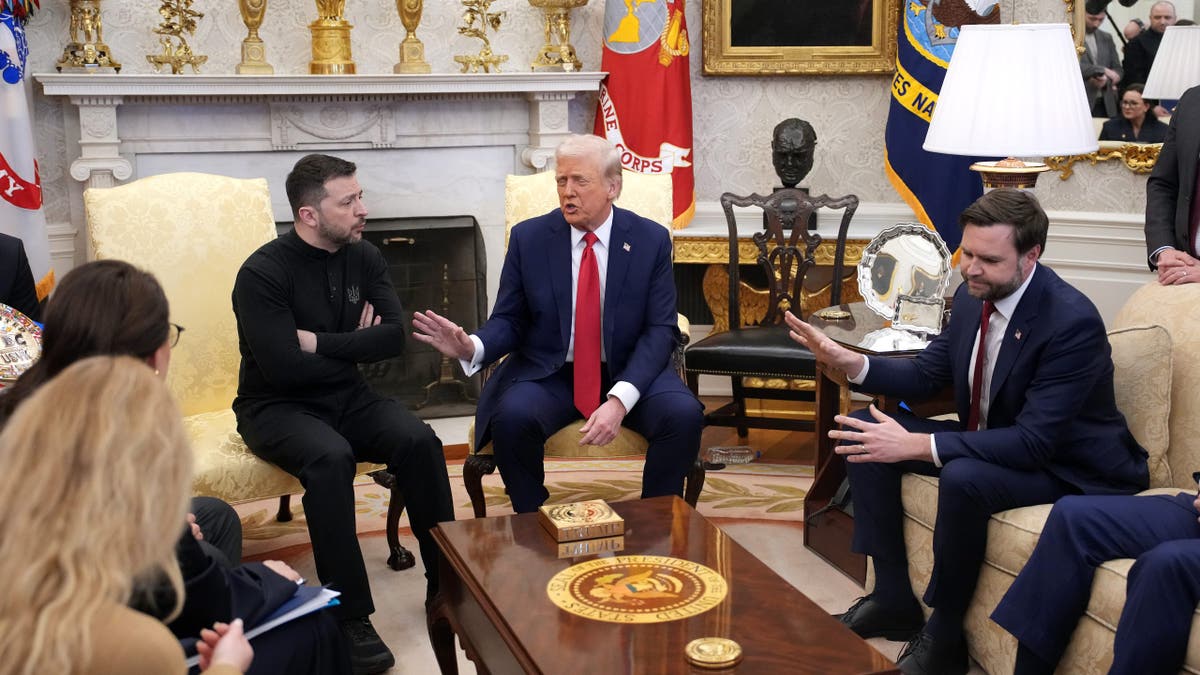
U.S. President Donald Trump (C) and Vice President JD Vance meet with Ukrainian President Volodymyr Zelensky in the Oval Office at the White House on February 28, 2025 in Washington, DC. (Andrew Harnik/Getty Images)
A meeting between Putin and Trump would be their first since Trump returned to office this year. It would be a significant milestone in the 3-year-old war, though there’s no promise such a meeting would lead to the end of the fighting since Russia and Ukraine remain far apart on their demands.
Trump, appearing before reporters later at the White House, didn’t answer questions about a potential location for a meeting but when asked about a summit with Putin and Zelenskyy, said «there’s a very good prospect that they will» meet.
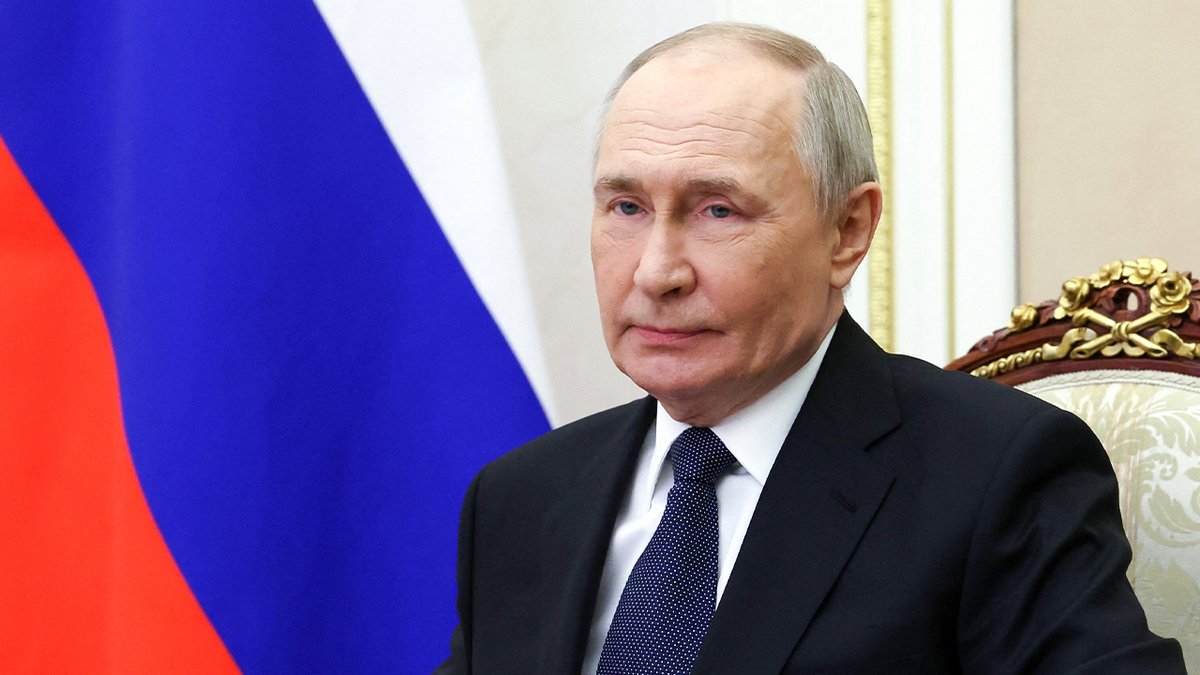
In this pool photograph distributed by the Russian state agency Sputnik, Russia’s President Vladimir Putin chairs a Security Council meeting via videoconference at the Kremlin in Moscow on March 28, 2025. (SERGEI ILYIN/POOL/AFP via Getty Images)
CLICK HERE TO GET THE FOX NEWS APP
The president declined to predict how close he was to reaching a deal to end the fighting, saying, «I’ve been disappointed before with this one.»
The Associated Press contributed to this report.
donald trump,vladimir putin,russia,ukraine,world

 CHIMENTOS3 días ago
CHIMENTOS3 días agoMalas noticias para Wanda Nara: por qué la bajaron misteriosamente de MasterChef: «No va a salir este año»

 POLITICA3 días ago
POLITICA3 días agoAxel Kicillof reclamó ante la Corte Suprema $12 billones que le adeuda Nación

 SOCIEDAD3 días ago
SOCIEDAD3 días ago“¡Vergüenza nacional! La Policía Federal recibirá aumentos ridículos de solo $10.000 y vive un colapso salarial mientras el costo de vida se dispara”













